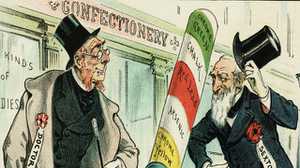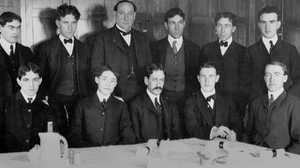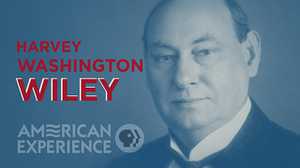“Gloom and Horror Unrelieved”
Upton Sinclair’s classic novel 'The Jungle' almost never saw the light of day.

By the turn of the 20th century, the unsavory practices of the country’s meat processing industry had already engendered some major scandals. The most notable of these involved accusations that the military had killed more soldiers in the Spanish American War of 1898 with shoddy meat supplies than the Spanish had killed with gunfire.
Both officers and foot soldiers accused the Army of feeding them “embalmed beef,” a term for rotting meat preserved with the then-popular food preservative formaldehyde. They presented so much evidence that the federal government was forced to hold public hearings, leading to the resignation of the Secretary of War. The hearings concluded, however, that the beef served in Cuba was no worse than the beef sold in American grocery stores, meaning that no charges could be brought against the military.
As there were no federal laws regarding food safety, the meatpackers, as they were known, could not be prosecuted either. Despite scandals such as this, Congress remained reluctant to alienate the food and chemical industries, which provided legislators with thousands of dollars every year. Even the well-known work of people like government chemist Harvey Washington Wiley, whose tireless efforts to expose widespread fraud and toxicity in the food supply spanned decades, couldn’t gain enough traction to spur policymakers to enact reform.
But the American public was starting to get angry. And another scandal, again involving the meatpacking industry, was about to change everything.
In early November 1904, just as Theodore Roosevelt won election to the presidency, the writer Upton Sinclair traveled by train from the East Coast to Chicago, where he moved into a bare-bones settlement house, intent on researching his new novel.
The previous July, butchers had gone on a wage strike at packing-houses in nine cities, from Omaha to New York. The two-month strike failed because meatpacking firms, using a strategy developed by Chicago’s famously ruthless Armour family, hired unskilled, non-union replacements who could be paid less than the union butchers.
Sinclair, a 28-year-old son of a New York shoe salesman, was instantly sympathetic. He had barely paid for his own education at City College by writing jokes, dime novels, and magazine articles. Upon graduation in 1897, the aspiring novelist and freelance journalist had joined the worker friendly socialist cause, partly inspired by his own struggles to make a living. He had written up a passionately pro-strike article and sent it, unsolicited, to the Kansas-based socialist newspaper, Appeal to Reason. In the same package Sinclair included a copy of his recent Civil War novel, Manassas, which had been a critical, if not commercial, success. The combination prompted the paper’s editor, Julius Wayland, to make him an offer. He would print Sinclair’s essay on the butcher’s strike, and he would pay the writer $500 for a serialized novel telling the story of the valiant workers of Chicago’s stockyards. Sinclair quickly accepted. He then persuaded his editor at Macmillan Publishing to give him another $500 contract to turn the serialized novel into a print book.
Flush with a grubstake of $1,000 (about $30,000 today), Sinclair spend seven weeks in Chicago’s yards, living in a settlement house operated by a friend of the anti-poverty leader, Jane Addams, often dressing in the grubby clothing of a worker to blend in. He observed and interviewed, gathering notes and sketches before returning to the East Coast, where with his wife and son he moved into a New Jersey farmhouse and settled down to write the most influential book of his prolific career.
The novel’s main character was a Lithuanian immigrant, carrying that familiar dream of building a good life in America. “I will take care of us,” he tells his wife. “I will work harder.” In the end, the hardworking laborer is nearly destroyed by working conditions at the fictional “Anderson” meat-processing company. He eventually loses his health, family, and friends in the meatpacking industry but in Sinclair’s conclusion finds some hope, at least, by embracing the brotherhood of socialism.

The serialized version of Sinclair’s novel, which he titled The Jungle, had a limited socialist readership, but he was counting on his editor at Macmillan to grow that audience. He mailed the installments to the publishing firm. Chapter by chapter, his editor became more dismayed. The book described diseased cattle arriving by railroad in Chicago to be butchered and sold to American housewives. “It was a nasty job killing these,” Sinclair wrote, “for when you plunged your knife into them they would burst and splash foul smelly stuff into your face.” Sinclair also evoked the embarrassing food scandals of the Spanish-American War: “It was stuff such as this that made the ‘embalmed beef’ that killed several times as many United States soldiers as all the bullets of the Spaniards; only the army beef, besides, was not fresh canned, it was old stuff that had been lying around for years in cellars.”
Pickled beef had to be bathed in acid; the men working that line had their fingers eaten away by repeated exposure. Tuberculosis germs thrived in the moist, stinking air of the processing plants and spread from animal to animal, worker to worker. In the rendering rooms, there were open vats of acid set into the floor, to help break down the carcasses. Workers occasionally fell in, and “when they were fished out, there was never enough of them left to be worth exhibiting.” Sometimes, Sinclair wrote, an exhausted worker, staying after hours to earn a little more, would slip into a vat and “be overlooked for days till all but the bones of them had gone out into the world as Anderson’s [his thin disguise for Armour’s] Pure Leaf Lard.”
His editor sent chapters out for review by well-connected friends and advisors. Equally dismayed, they wrote back to insist that the descriptions couldn’t be true. In late summer a new chapter recounted the ways that meat in a state of decay, even when fuzzed over with mold, could be cleaned, “dosed with borax and glycerin and dumped into hoppers and made over again for home consumption.” It related that the packers routinely put out poisoned bread to keep the rat population down, and “then the rats, bread and meat would go into the hoppers together.”
It was too much. His editor declared that the book was “gloom and horror unrelieved.” Macmillan asked Sinclair to remove objectionable passages. Sinclair took the recommendations to some of his fellow writers, among them reformist journalists Lincoln Steffens and Ray Stannard Baker. Both those journalists had made names for themselves writing for the muckraking magazine McClure’s, becoming famous for stories exposing government and corporation corruption. Both encouraged Sinclair to reject the cuts that Macmillan wanted and to keep his novel rich in the blood-spattered details of the Chicago stockyards. Steffens did warn him, though, that he should expect continued resistance and revulsion. Sometimes, the veteran journalist noted gloomily, “it is useless to tell things that are incredible, even though they may be true.” Baker, whose exposés of the railroad industry had led to Roosevelt’s obsession with reforming it, thought Sinclair should have written a nonfiction book instead of a novel, but he counseled his friend not to back down.
Sinclair determined that “I had to tell the truth and let people make of it what they would.” In September 1905 Macmillan canceled his contract, generously offering that he keep the $500 advance. Disappointed, Sinclair shopped The Jungle around to other publishers but found no takers. He arranged to publish a “sustainers edition,” essentially self-publishing. Issued under the Jungle Publishing Company imprint, it was offered to subscribers of the Appeal, and sold surprisingly well—netting him almost $4,000—but, to his disappointment, failed to gain any real national attention.
Still, Sinclair refused to give up on his novel. He kept shopping The Jungle to established publishing firms.
He suffered more rejections from publishers wary of potential lawsuits but finally got a meeting with a young editor, Isaac Marcosson, who worked for the publishing house Doubleday, Page & Company. As a newspaper writer in Louisville, Kentucky, Marcosson had written a positive review of Sinclair’s 1903 novel, The Journal of Arthur Stirling. He welcomed the author into his office and listened to Sinclair’s promise that the hefty bundle of pages he carried was “something sensational.” Marcosson lugged the manuscript home and became engrossed, staying up all night reading it. In the morning he presented it enthusiastically to his boss, Walter Hines Page.
Both Page and his partner, Frank Nelson Doubleday, needed persuading. Page shared much of Marcosson’s enthusiasm but agreed with more dubious Doubleday that the story’s revolting details might be too much for readers to stomach. Page cautioned their young employee that if they did contract for Sinclair’s book, it would be with the understanding that Marcosson would be responsible for “launching and exploiting” The Jungle. The publishers also insisted on sending a copy of the manuscript to the Chicago Tribune for an opinion on whether the book’s grisly descriptions had any basis in reality. Tribune editors responded with a two-dozen-page rebuttal of the packinghouse descriptions. Alarmed, Page and Doubleday called Sinclair to their offices.
Sinclair promptly began picking apart the Tribune’s critique.
For instance, the paper had denied that the tuberculosis bacterium could survive on walls or floors of the packing rooms. Sinclair pointed out that the germ could indeed survive on those surfaces and could transfer to anything that touched them. He’d brought medical studies to prove it, as well as other evidence to back up his story. He further noted that the paper’s owners were obviously friendly with the meatpackers and sided with them. In fact, it would turn out that the newspaper’s management had not assigned a reporter to study Sinclair’s claims but instead passed the task on to a publicist who worked for the meatpackers.
The Tribune’s fervent denial of the story made Page, also a former reporter, suspicious. As well as a book publisher, he was editor of the business magazine World’s Work. His journalist’s instincts told him something wasn’t right about the Tribune report. It smelled like a whitewash. He decided on an independent investigation. The publishing company sent Marcosson and the company’s lawyer on an expedition to Chicago. Both men returned disgusted and horrified by what they’d seen. They’d also secured multiple sources willing to provide public statements about the odious conditions in the yards. Page became convinced and he persuaded his partner Doubleday to agree. Page also decided that when The Jungle went on sale, he would buttress it by publishing factual reporting on the horrors of the yards in World’s Work. Sinclair signed his book contract with the publishing firm on January 6, 1906.
As Doubleday, Page prepared to publish The Jungle in early 1906, Marcosson told Sinclair that the firm wanted major revisions. The serialized version of the novel, the last chapter of which had appeared in Appeal to Reason the previous November, featured too much overwrought, preachy philosophy, including its many references to exploitive employers preying on hapless workers. Doubleday, Page wanted to excise Sinclair’s overt comparisons of worker life to an existence in a wild forest with “the strong devouring the weak”—the source of his title. At such a late date, after his struggles to find a publisher, he gave in. The publisher cut 30,000 words and ordered an initial print run of 20,000 copies. Publication was set for February 26, which was, again by pure coincidence, the day the Senate passed a food and drug bill, which would promptly founder in the House.
Marcosson speculated that the book would either be “a sensational success or a magnificent failure.” To help get the word out, Sinclair sent an early copy to his muckraking journalist friend Baker at McClure’s. Marcosson sent copies to the wire services, Associated Press and United Press with a note urging them to quote at will. And he sent extra copies to newspapers and magazines in every major American city. The publishing company also sent a copy to President Roosevelt, autographed by Sinclair.
Embraced by an American public increasingly skeptical of the food supply, The Jungle sold 150,000 copies that first year alone and would be translated into more than 17 other languages. The brutal descriptions that had so appalled McMillan helped lead to a tidal wave of support for food regulation. Even further, like Sinclair’s publisher, Roosevelt sent his own fact-checkers to Chicago and they reported that the situation was as bad, if not worse, than in the book.
Armed with that information—and helped by the sudden refusal of European countries to import any American meat—Roosevelt was able to force Congress to pass a Meat Inspection Act in June of 1906. The rush of that political tide led to passage, in that same month, of the first Federal Food and Drug Act, which would lay down the foundation of today’s U.S. Food and Drug Administration.
But the resistance of the food processing industry did not abate. Manufacturers were able to persuade the government to water down some of the regulatory requirements in 1906—and they have maintained that push until today. After intense industry lobbying, for instance, the Trump administration just rolled back one of the key requirements of the Meat Inspection Act, which is that federal safety inspectors oversee pork inspection in processing plants. The New Swine Inspection System will return most of the inspection duties to the pork processers themselves, essentially returning to the system in place before Sinclair’s Jungle as published. The beef industry is now lobbying for a similar privilege.
These repeals should serve as a reminder that consumer protections can never be taken for granted. And that today, almost 114 years after those first regulations passed, we should remain vigilant. Perhaps another Upton Sinclair or Harvey Wiley will be found to help make that case.
This piece is excerpted from The Poison Squad: One Chemist's Single-Minded Crusade for Food Safety at the Turn of the Twentieth Century.

Deborah Blum is a Pulitzer-prize winning science journalist, the author of The Poison Squad: One Chemist's Single-Minded Crusade for Food Safety at the Turn of the Twentieth Century, as well as five other books. She lives in Boston and is director of the Knight Science Journalism Program at MIT.









